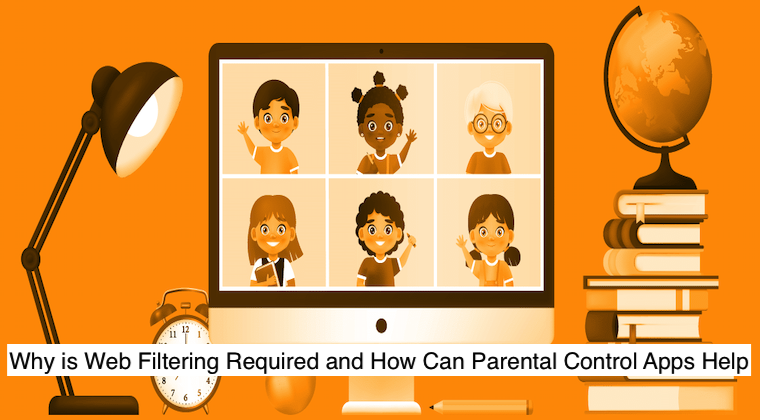+1 845 259 2974 (11 a.m to 7 p.m CST)
Why is Web Filtering Required and How Can Parental Control Apps Help?

The digital age, while brimming with advantages, also presents a myriad of challenges, especially for parents concerned about their children's online safety. No doubt digital technology has given a lot of benefits in various fields of life. Even with kids, they can do a lot with the help of the internet. They are now learning through technology, they are getting necessary help from there, and they are even making friends over there. But how much is too much?
This is where parents need to step in and decide. Are kids getting addicted to the use of the internet? Are they accessing things that they shouldn’t have access to? A free and open access to everything on internet is indeed very dangerous. That is why web filtering is necessary to keep them limited to the stuff that they require. This can be done with the help of a good parental control app.
Web filtering, a method to screen and exclude access to websites or content, has become an essential tool in navigating the vast expanse of the internet. But why is web filtering necessary, and how do parental control apps factor into this equation? Let's delve into this issue.
Why is Web Filtering Necessary?
Web Filtering is an amazing feature offered by parental control apps, that can help you keep your kids at limits. But is it necessary? Many parents are still confused about whether they should put up parental control apps for their kids or if it is completely unnecessary.
To clear that up, let’s investigate how unlimited access to the internet can affect kids’ mental and emotional health.
- Overwhelming Volume of Content: The internet is a colossal repository of information, but not all of it is suitable for every age group. Children and teens, with their still-developing cognitive abilities, are particularly susceptible to harmful or misleading content.
- Exposure to Inappropriate Content: From explicit materials to violent content, the internet has facets that can be disturbing for younger audiences. Without proper filtering, children might stumble upon such content, even unintentionally.
- Cyber Threats: Beyond explicit content, the internet is rife with cyber threats such as malware, phishing sites, and scams. These threats can compromise personal data or lead to financial losses.
- Addictive & Distracting Nature of Some Websites: With an increase in online games and social media platforms, children might get easily distracted, which can interfere with their studies, sleep, and real-world social interactions.
The Role of Parental Control Apps:
Parental control apps have emerged as one of the most effective ways for parents to ensure their children’s online safety. These apps offer features beyond mere web filtering. Here's how they can assist:
- Customizable Web Filters: While most browsers might offer basic filtering, parental control apps allow for greater customization. Parents can block specific websites or entire categories of content, tailored to their child's age and maturity level.
- Time Management Features: It's not just about what children access, but also how long they access it. These apps often come with screen time limits, allowing parents to set designated hours for study and play. This aids in instilling discipline and ensuring a healthy balance between online and offline activities.
- Monitoring & Alerts: Some apps provide parents with reports on their child’s online activities. If a child tries to access a restricted site or spends too much time on a particular platform, parents can receive real-time alerts.
- Location Tracking: Beyond digital safety, some parental control apps also offer location tracking features, ensuring physical safety by allowing parents to know their child's whereabouts.
- Teaching Safe Online Habits: By using these apps, parents have a platform to discuss and teach safe online habits. Children can understand the reasoning behind certain restrictions, making them more likely to internalize safe browsing habits.
- Protecting Privacy: Children might not always understand the implications of sharing personal information online. Parental control apps can restrict access to sites or platforms that pose a threat to privacy, ensuring that children don't inadvertently share sensitive data.
Potential Concerns and Balancing Acts:
However, as beneficial as web filtering and parental control apps are, they're not without challenges. Over-reliance on these tools can lead to a false sense of security. No software is foolproof, and tech-savvy kids might find ways to bypass them. Additionally, excessive monitoring can strain the parent-child relationship, making kids feel suffocated or distrusted.
It’s crucial for parents to strike a balance. These tools should complement, not replace, open communication about online safety. Regular discussions, transparency about the reasons for using these apps, and allowing older children to have a say in setting boundaries can foster trust and understanding.
In an interconnected world, the significance of web filtering cannot be understated. As digital threats evolve, the tools we use to counter them must also adapt. Parental control apps stand at the forefront of this battle, offering parents a comprehensive solution to safeguard their children in the digital realm.
However, these apps are most effective when used as part of a broader strategy encompassing education, open dialogue, and trust-building. In this way, parents can not only protect their children but also equip them with the skills and knowledge they need to navigate the online world safely and responsibly.




















